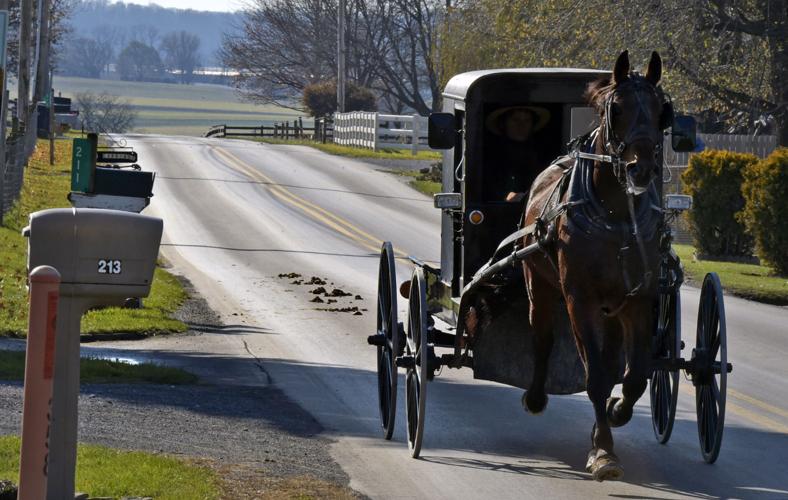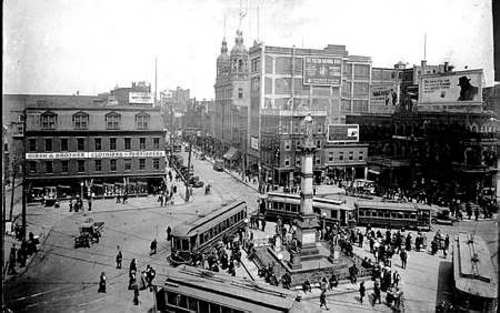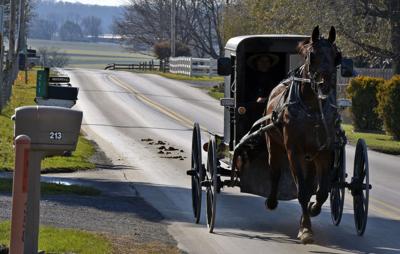It’s a hot, summer day as you drive along a rural Lancaster County road. You pass a horse-drawn wagon and are about to pass a horse-and-buggy when you realize the horse left ... something behind.
On instinct, you deftly move your car around the pile of excrement.
It’s not until you go into your garage several hours later that you’re greeted by a smell that says you weren’t so deft after all.
Why are horse owners not responsible for cleaning up after their animals on public roads?
That’s the question anonymously submitted by a reader to LancasterOnline’s We the People journalism project. You ask questions, you vote on your favorite, and we report to find an answer.
Join our We the People Facebook group to keep up with the latest news and discussions.
The anecdote is common in Lancaster County, the capital of horses in Pennsylvania, according to a study this year of the equine industry statewide.
A 2012 census of farm animals counted nearly 16,000 horses in Lancaster County. That’s about one horse per 33 people, according to census data from the same year.
It’s no wonder that there’s a lot to dodge on Lancaster County roadways.
Get your giggles out of the way, and let’s ... dig in.
First, a little history

Lancastrians saw their first traffic jams in the 1930s as cars and trucks competed with trolleys, buses and horse-drawn vehicles on city streets. A new plan to bring back streetcar service to Lancaster city is being considered.
Horse-drawn transportation was once the norm in America.
“Can you imagine, say, 120 years ago, when everyone was going everywhere with horse-drawn vehicles?” said Steven Nolt, senior scholar at the Young Center for Anabaptist and Pietist Studies at Elizabethtown College.
“You didn’t have people cleaning up after horses then,” he said.
As modern America developed and paved roads and automobiles replaced dirt roads and buggies in most of the country, the Amish population in Lancaster County maintained a piece of history.
“There’s no ‘legal tradition,’” for cleaning up after horses, Nolt said.
Regulations to clean up after horses, he said, is not “something I’ve ever thought that much about.”
Isn’t manure dangerous?
Well, not really. Let’s compare horse manure with dog poop.
“It’s especially important to clean up after dogs and cats because of parasites like roundworm and hookworm. Roundworm from animal feces stays alive in the soil and can be picked up by children,” according to Pennsylvania Department of Agriculture spokeswoman Shannon Powers.
But horse manure doesn’t pose the same dangers, and makes “excellent fertilizer,” she said.
The Pennsylvania Department of Environmental Protection does require management plans for farms that generate a large amount of animal waste, according to spokesman John Repetz.
But for individual animals, clean up regulations are handled at the municipal level, he said.
A debate, elsewhere
It turns out this topic has prompted serious debate in several places in the U.S.
Auburn, Kentucky, has an ordinance that requires large animals to wear collection bags to catch their droppings.
In 2016, Amish residents there sued the city over the law, saying it violates their religious freedom. The litigation is ongoing, according to news reports.
In 2016, a county in Indiana repealed an ordinance that would have fined people whose horses left manure on county roads.
There's also Marlinton, West Virginia, where an ordinance passed in 2014 requires horses to wear devices to catch their droppings while being ridden or driven in town.
Manure clean up
There are some instances in Lancaster County where poop cleanup is given more attention.
If a horse from Lancaster city’s mounted unit makes a deposit on the street or a sidewalk, the officer reports the location to the city's streets department. Someone from the department cleans it up, according to police Lt. Bill Hickey.
“We can't speak for what happens outside Lancaster city,” he said. “There's not a whole lot of horse owners or traffic that comes through the city.”
At Lancaster County Parks, rangers give horseback riders a bit of leeway.
“It's always preferred that horseback riders make every attempt to clean up after their horses,” said Chief Ranger Ben Arnold.
But sometimes riders don't notice what their horse is leaving behind, and, even if they do, it can be cumbersome to dismount and clean it up.
“Also, because horse droppings are made of plant compounds, it will usually dissolve within days,” he said.
For the most part, horseback riders seem to respect the parks and pick up after their horses, Arnold said.
Not an issue
Based on the officials LancasterOnline spoke with, Lancaster County residents haven’t made much of a fuss.
East Lampeter Township manager Ralph Hutchison said it's not an issue he's dealt with.
The municipality includes a mix of rural residences and suburban shopping centers. On Lincoln Highway East, it's common to see a horse-and-buggy being passed by a line of cars.
“I have not received a complaint,” he said.
County Commissioner Josh Parsons said he, too, hasn't received “a complaint about Lancaster County ‘road apples.' ”
“Did you know there is even an award you can get if you run the Garden Spot Half Marathon and the Bird-in-Hand Half Marathon in one year called the Road Apple Award?” he said.
“We wouldn’t want them to run out of raw material for that, would we?”






 LINDSEY BLEST | Staff Writer
LINDSEY BLEST | Staff Writer


 TIM STUHLDREHER | Staff Writer
TIM STUHLDREHER | Staff Writer![Why has a head stared from an attic window in Peach Bottom for more than 100 years? [We the People report]](https://bloximages.newyork1.vip.townnews.com/lancasteronline.com/content/tncms/assets/v3/editorial/2/3f/23f44d44-ea4b-11e7-9a18-c793ee43cfac/5a426088acb19.image.jpg?crop=1416%2C1160%2C6%2C14&resize=150%2C123&order=crop%2Cresize)
 TOM KNAPP | Staff Writer
TOM KNAPP | Staff Writer![How Lancaster County's abandoned 'goat path' could become a recreational trail [We the People report]](https://bloximages.newyork1.vip.townnews.com/lancasteronline.com/content/tncms/assets/v3/editorial/a/e9/ae91ea68-f7a9-11e7-a89e-17641c793368/5a58ce3d1db0e.image.jpg?resize=150%2C95)
![Is there an underground tunnel from the Lancaster County Courthouse to the Lancaster prison? [We the People report]](https://bloximages.newyork1.vip.townnews.com/lancasteronline.com/content/tncms/assets/v3/editorial/d/d5/dd554622-a2fb-11e7-829f-db6f6ba020fb/59cabd0c77e88.image.jpg?resize=150%2C121)
![Restaurants, even repeat violators, are rarely closed for failing state inspections; Why? [We the People report]](https://bloximages.newyork1.vip.townnews.com/lancasteronline.com/content/tncms/assets/v3/editorial/d/71/d719458c-01ed-11e8-87be-07e4b1a73e71/5a6a07763c561.image.jpg?resize=150%2C102)
![Are Lancaster County's volunteer fire companies raising enough funds to protect their communities? [We the People report]](https://bloximages.newyork1.vip.townnews.com/lancasteronline.com/content/tncms/assets/v3/editorial/4/8c/48c157f2-af7c-11e7-9d66-6f0a84449e04/59dfb636e99ad.image.jpg?resize=150%2C105)


